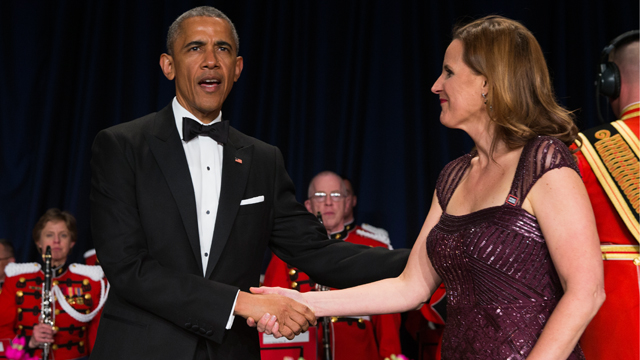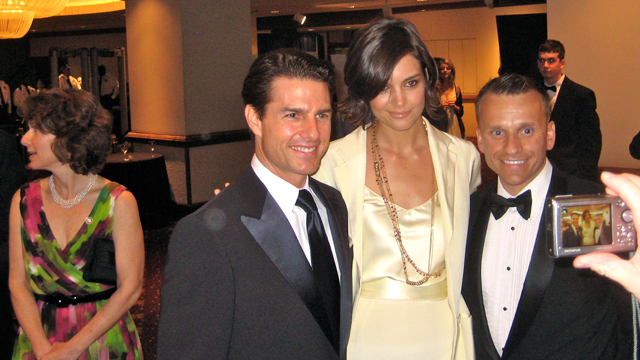This post first appeared at PressThink.

President Barack Obama, left, is greeted by White House Correspondents Association president Christi Parsons during the White House Correspondents’ Association dinner at the Washington Hilton on Saturday, April 25, 2015, in Washington. (Photo by Evan Vucci/AP)
Have you ever come to know members of a family who collaborate in staying silent about something bad that happened in the past, something no one wants to talk about because to talk about it would probably tear the family apart?
None of that has to be said, of course. It’s all done by antennae. The result is that serious talk about certain subjects is off limits. Key routes into that subject are closed off, because the signaling system activates itself three or four rings out from dread center. To an outsider this manifests itself as an inexplicable weirdness or empty quality, difficult to name. To insiders it becomes: this is who we are… the people who route around —
I mention this because I think it helps in interpreting a bizarre event that unfolds in Washington and on many a media platform: the White House Correspondents Association dinner. How bizarre? Well, look at the evidence of compulsion:
entering #WhiteHouseCorrespondentsDinner weekend. We all hate it; it’s antithesis of journalism; but everyone goes to every party they can.
— Howard Fineman (@howardfineman) April 24, 2015
It’s not like they don’t realize it. This is from POLITICO, house organ for the insider class in DC.
Everyone knows the White House Correspondents Association dinner is broken. What started off decades ago as a stately formal celebration of the best of presidential reporting has morphed into a four-day orgy of everything people outside the Beltway hate about life inside the Beltway— now it’s not just one night of clubby backslapping, carousing and drinking between the press and the powerful, it’s four full days of signature cocktails and inside jokes that just underscore how out of step the Washington elite is with the rest of the country. It’s not us (journalists) versus them (government officials); it’s us (Washington) versus them (the rest of America).
“Everything people outside the Beltway hate about life inside the Beltway.” True! And yet they keep doing it. Why?
I’m sure you have your ideas. Here is mine. I know it will sound crazy (and provide a few chuckles) to those in the room at the Washington Hilton, but I don’t care because the event is itself one gigantic neurotic symptom that begs for some interpretation.
The Washington press corps is like that big extended family with a terrible secret that cannot be confronted because everyone knows how bad it would be if the discussion ever got real. The event at the center of this neurotic system: the failure to detect a phony case for war in 2002 and 2003 and more generally to challenge the Bush forces after 9/11. And this wasn’t just any failure. For a press that imagines itself a watchdog, failing to detect a faulty case for war, then watching the war unfold into the biggest foreign policy disaster in memory… that is an event so huge and deflating that it amounts to an identity crisis.
Now add to that very specific failure a larger lesson that is also too painful to face: in Washington access journalism has been a bust. It doesn’t work. Its practices made possible the spectacular fall down in the run-up to the Iraq War. (Under Obama it’s been so thin that POLITICO is this week asking: is the White House press corps becoming obsolete?) After a maximal failure like 2002-04 there needed to be a critical reckoning with the whole idea of “access to inside sources as reliable route to scoops.” You can’t maintain that idea and think of yourself as a watchdog, an adversarial force. Not with what happened in the run-up to the Iraq war.
But what if you still want both? Your scoop system, and your self-image as a watchdog. Your insider status, and the critical distance that with the right story could make you a hero of the republic. What if you want your parties with the powerful, and your check on power. What if you have to choose between these alternatives, but you can’t choose because the family has no history of making difficult choices like that. In circumstances like this, you are going to pick denial. And here we find a subterranean route into the Washington Hilton tonight.

Katie Holmes and Tom Cruise at the WHCA dinner, 2009. (Photo: Jay Tamboli/flickr CC 2.0)
The Washington press corps needed the equivalent of a Truth and Reconciliation Commission to sort through these glaringly obvious conflicts. Instead they just moved on. No one made that decision consciously. But it happened. Access journalism did not have to answer for its sins. Judith Miller did. That’s the simplest way I can put it. And because that event — which was a massive, wrenching and psychological event — did happen the access orgy that is called the White House Correspondents Association dinner can today go on.
There is access to the dinner itself. There is access to the parties that surround the dinner. There is access to the celebrities and power players who show up at the dinner. But access is the god that failed, with terrible consequences that no one in Washington journalism can reckon with. Instead, they party the pain away. And that is one thing the night is “about.”
That tweet was deleted.
The views expressed in this post are the author’s alone, and presented here to offer a variety of perspectives to our readers.



